
HISTORY OF SCIENCE
Scope & Guideline
Bridging Eras: The Journey of Scientific Discovery
Introduction
Aims and Scopes
- Interdisciplinary Historical Analysis:
The journal promotes research that integrates history with other disciplines, such as sociology, philosophy, and cultural studies, to provide comprehensive insights into the evolution of scientific thought and practice. - Cultural and Social Contexts of Science:
It examines how cultural and social factors influence scientific development, including the roles of gender, race, and class in shaping scientific institutions and knowledge. - Global Perspectives on Science:
The journal emphasizes a global approach to the history of science, exploring scientific practices and exchanges across different geographical and cultural contexts. - Technological Development and Society:
Research often focuses on the relationship between technological advancements and societal changes, analyzing how innovations reshape human experiences and environments. - Science Diplomacy and International Relations:
The journal addresses the role of science in international diplomacy, exploring how scientific collaboration and competition affect global political landscapes. - Historical Methodologies in Science:
It encourages the application of diverse historical methodologies, including qualitative and quantitative approaches, to enrich the understanding of scientific developments over time.
Trending and Emerging
- Science and Environmental Change:
An increasing number of articles focus on the historical interactions between scientific knowledge and environmental issues, highlighting how science has both shaped and been shaped by ecological concerns. - Science and Health Politics:
There is a growing emphasis on the historical intersections between science, medicine, and public health, particularly in the context of contemporary health crises and debates over medical ethics. - Decolonization of Science:
Emerging works are increasingly addressing the decolonization of scientific narratives, exploring how colonial histories have influenced scientific practices and knowledge production. - Digital Humanities and Science:
The integration of digital tools and methodologies into historical research is gaining traction, with studies exploring how technology transforms the ways we engage with historical scientific data. - Interdisciplinary Collaborations:
The journal is witnessing a rise in publications that reflect interdisciplinary collaborations, especially between the humanities and sciences, to address complex historical questions.
Declining or Waning
- Traditional Biographical Studies:
Research focused solely on the lives of individual scientists has become less common, as scholars increasingly favor thematic and contextual analyses that provide broader insights into scientific practices and their implications. - Eurocentric Narratives of Science:
There has been a noticeable reduction in publications that center exclusively on European scientific developments, indicating a shift towards more inclusive narratives that encompass global contributions and perspectives. - Histories of Science as Isolated Entities:
The journal has moved away from treating the history of science as a separate and isolated domain, with fewer articles emphasizing science in a vacuum, instead focusing on its interactions with society, politics, and culture. - Focus on Purely Technical Developments:
There is a waning interest in articles that center solely on technical advancements without addressing their social or historical contexts, reflecting a broader trend towards interdisciplinary research.
Similar Journals

NUOVA RIVISTA STORICA
Fostering Critical Perspectives on Historical ScholarshipNUOVA RIVISTA STORICA is a distinguished journal dedicated to the field of history, published by SOC EDITRICE DANTE ALIGHIERI SRL in Italy. With a long-standing tradition since its inception, the journal has been a pivotal platform for scholarly discourse, illuminating various historical narratives and perspectives. Though it is currently not an open-access publication, NUOVA RIVISTA STORICA provides robust access options for readers and researchers keen on exploring nuanced historical analyses. As demonstrated by its standing in the Q4 quartile of history journals and its ranking of #1425 out of 1760 within the Scopus database, it remains a valuable resource for emerging scholars and seasoned academics alike. The journal's commitment to advancing historical scholarship makes it an essential read for anyone engaged in the study of history, culture, and societal evolution.
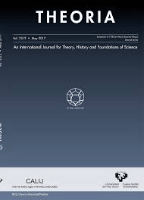
THEORIA-REVISTA DE TEORIA HISTORIA Y FUNDAMENTOS DE LA CIENCIA
Advancing the Dialogue on Science and HistoryTHEORIA-REVISTA DE TEORIA HISTORIA Y FUNDAMENTOS DE LA CIENCIA, published by the Servicio Editorial Universidad del País Vasco, is a leading open access journal dedicated to advancing the fields of History, Philosophy of Science, and related disciplines since its inception in 2003. With a robust impact factor placing it in the esteemed Q1 and Q2 quartiles in its respective categories, this journal serves as a crucial platform for researchers, professionals, and students who are engaged in profound discussions and analyses of scientific foundations and historical contexts. Based in Spain, THEORIA has consistently demonstrated its commitment to scholarly excellence, achieving notable rankings in Scopus, particularly in the fields of Arts and Humanities, where it holds a rank of #169 in Philosophy and #59 in History and Philosophy of Science. The journal not only allows immediate open access to its diverse range of articles, fostering global knowledge dissemination, but also aims to bridge connections across varied philosophical inquiries and historical explorations within science. Join the dialogue today in shaping the future understanding of our scientific heritage.
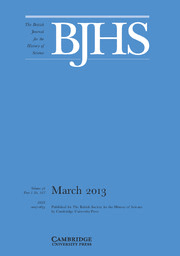
BRITISH JOURNAL FOR THE HISTORY OF SCIENCE
Bridging past and present in the realm of science.The British Journal for the History of Science is a premier academic publication dedicated to exploring the intricate relationship between science and society throughout history. Published by Cambridge University Press, this journal features a rich blend of original research articles, critical reviews, and scholarly discussions that illuminate the development of scientific ideas and practices from antiquity to the modern era. With a strong reputation reflected in its Q1 classification in History and Q2 in History and Philosophy of Science for 2023, this journal plays an essential role in advancing the field by engaging researchers, professionals, and students alike. The journal's commitment to intellectual rigor and cross-disciplinary dialogue fosters a deeper understanding of how scientific thought has shaped our world. Although it does not offer open access, the journal maintains a strong academic footprint, making significant contributions to historical scholarship. Join a community of scholars who are passionate about unfolding the rich tapestry of scientific history, as the British Journal for the History of Science continues to publish cutting-edge research until 2024.

History of science and technology
Illuminating the past to inspire future innovations.History of Science and Technology is an esteemed open-access journal published by SUIT Publishing, dedicated to advancing knowledge in the interrelated fields of history, science, technology, and their cultural implications. Since its inception in 2013, this journal has served as a vital platform for researchers, professionals, and students, fostering interdisciplinary dialogue and critical discourse on historical developments in science and technology. With an impressive reputation reflected in its 2023 Scopus rankings, where it ranks in the Q2 and Q3 quartiles across multiple related fields, it has positioned itself as a prominent resource in the academic community. The journal is particularly recognized for its contributions to archeology, museology, and the philosophy of science, making it essential reading for those engaged in these domains. Based in Kyiv, Ukraine, and operating under an open-access model, the History of Science and Technology aims to make high-quality research widely accessible, ultimately enriching the historical narrative and encouraging scholarly engagement across disciplines.

Notes and Records-The Royal Society Journal of the History of Science
Revealing the Threads of Scientific ProgressNotes and Records - The Royal Society Journal of the History of Science is an esteemed scholarly journal published by the Royal Society in the United Kingdom, focusing on the historical aspects of science and its impact on modern scientific practices. With an ISSN of 0035-9149 and E-ISSN 1743-0178, this journal serves as a vital platform for researchers, professionals, and students who seek to explore the intricate connections between historical developments and contemporary scientific discourse. Recognized for its academic rigor, it holds a commendable position in the Q3 category of the History and Philosophy of Science field, ranking #56 out of 223 according to Scopus, and showcasing a 75th percentile ranking. Covering converged years from 1970 to 1973 and from 1975 to 2024, the journal publishes articles that contribute significantly to the understanding of the evolution of scientific thought. While it currently does not operate under an open access model, its esteemed content continues to engage a broad readership, fostering a deeper appreciation for the history behind scientific innovation and inquiry.

European Journal for Philosophy of Science
Pioneering Critical Discussions in the Philosophy of ScienceThe European Journal for Philosophy of Science, published by SPRINGER, stands as a prestigious platform for scholars in the realms of philosophy and history of science. With an impressive impact factor and categorized in the Q1 Quartile for both History and Philosophy of Science and Philosophy, this journal ranks among the top 10% of its peers, reinforcing its critical role in advancing academic discussions and insights within these fields. With its composition of rigorous peer-reviewed articles and a commitment to fostering interdisciplinary dialogue, the journal navigates foundational and contemporary issues that shape scientific inquiry. Although currently not Open Access, it provides invaluable access to researchers, professionals, and students who seek to deepen their understanding of the philosophical underpinnings of scientific practice. Housed in the Netherlands, the journal continuously engages with the evolving landscape of philosophy in the scientific domain, making it a key resource for anyone invested in the intersection of science and philosophy.
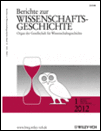
Berichte zur Wissenschaftsgeschichte
Charting the Course of Scientific Discovery Through TimeBerichte zur Wissenschaftsgeschichte is a distinguished journal dedicated to the critical exploration of the history of science and its philosophical underpinnings, published by WILEY-V C H VERLAG GMBH in Germany. Since its inception in 1978, this authoritative journal has served as a vital resource for scholars, practitioners, and students alike, contributing to a deeper understanding of scientific developments across historical contexts. The journal holds a respectable Scopus rank in the arts and humanities, placing it in the 79th percentile among history publications and the 56th percentile in history and philosophy of science, marking it as an essential venue for impactful research. Berichte zur Wissenschaftsgeschichte encourages contributions that advance scholarly dialogue and foster an interdisciplinary approach, making it a pivotal platform for the exchange of ideas in the evolving discourse of science history. While it currently does not offer Open Access options, the journal's subscription model ensures that its curated content remains accessible to a global audience dedicated to the interdisciplinary analyses of science's past.

Epistemology & Philosophy of Science-Epistemologiya i Filosofiya Nauki
Navigating the Complexities of Knowledge and UnderstandingEpistemology & Philosophy of Science-Epistemologiya i Filosofiya Nauki is a prestigious journal published by the Russian Academy of Sciences - Institute of Philosophy, dedicated to advancing the discourse in the fields of epistemology, philosophy of science, and related disciplines. With a distinguished presence in academia, this journal is recognized for its exceptional contributions, evident through its categorization as a Q2 journal in Arts and Humanities and Philosophy, and a Q1 journal in Cultural Studies. Covering an expansive scope from 2017 to 2023, it facilitates a vital dialogue among scholars and professionals aiming to explore the intersections of knowledge, culture, and education. Although currently not open access, the rigorous peer-review process ensures that only high-quality research is published, enriching the intellectual landscape. The journal's commendable rankings in Scopus, particularly in Arts and Humanities and History and Philosophy of Science, reflect its commitment to scholarly excellence. For researchers, educators, and students, Epistemology & Philosophy of Science serves as an essential resource for understanding and contributing to the ongoing philosophical dialogues that shape our comprehension of scientific inquiry.
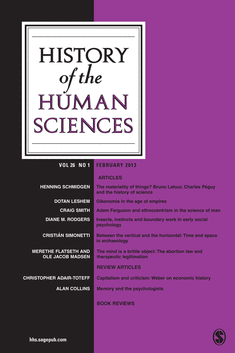
HISTORY OF THE HUMAN SCIENCES
Charting the Course of Scientific HistoryHISTORY OF THE HUMAN SCIENCES is a prestigious journal published by SAGE PUBLICATIONS LTD, dedicated to advancing the field of human sciences through multidisciplinary scholarship. With an ISSN of 0952-6951 and an E-ISSN of 1461-720X, this journal has been a cornerstone of research since its inception in 1988 and continues to address significant themes in history and philosophy of science. The journal boasts an impressive Q1 ranking in both History and History and Philosophy of Science categories as of 2023, underlining its impact and relevance in the academic community. Although not an open-access journal, it provides a wealth of scholarly articles that encourage critical dialogue and foster innovative thinking among researchers, professionals, and students alike. Located in the United Kingdom, the journal is committed to exploring the complexities of human experience and knowledge across varied contexts, making it an essential resource for anyone dedicated to understanding the historical dimensions of science and its philosophical implications.
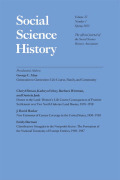
SOCIAL SCIENCE HISTORY
Exploring the Intersections of Past and PresentSOCIAL SCIENCE HISTORY is a leading interdisciplinary journal that combines insights from history and social science to foster a deeper understanding of societal transformations across time. Published by Société Vaudoise des Sciences Naturelles, this esteemed journal has established itself as a vital platform for scholarly discussion, contributing significantly to the field since its inception in the late 1970s. With a robust Q1 ranking in History and a respectable Q2 ranking in the broader category of Social Sciences, it boasts an impressive impact within the academic community, particularly among researchers focused on historical analysis and socio-cultural studies. The journal covers a diverse range of topics and offers rich, well-researched articles that appeal to scholars at all levels, igniting critical discourse on pertinent historical and social issues. Although it is not an open access journal, the high-quality articles published in SOCIAL SCIENCE HISTORY continue to serve as valuable resources for academia, ensuring its relevance and prominence within the scholarly landscape.